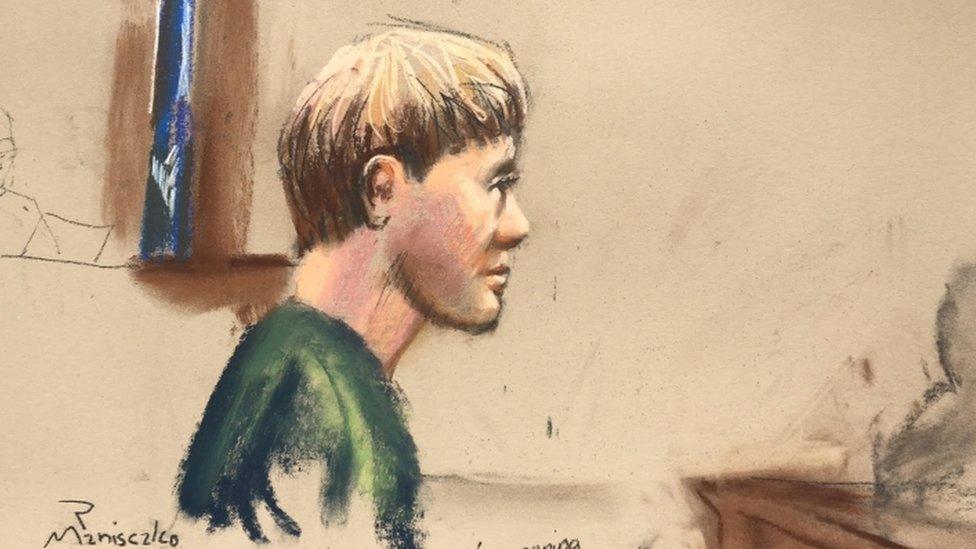Charleston church gunman Dylann Roof: Nothing wrong with me
- Published

Roof is acting as his own lawyer during his sentencing hearing
The man convicted of killing nine worshippers at a South Carolina church has addressed the jury for the first time to deny he is mentally ill.
"There is nothing wrong with me psychologically," Dylann Roof, 22, told jurors considering a death penalty.
The white supremacist did not ask to have his life spared, and said he would not present any evidence or witnesses.
Prosecutors shared excerpts from his jailhouse diary as they argued he showed no remorse for the killings.
This was the first time Roof spoke to the 12-person jury that found him guilty last month of all 33 federal offences relating to the attack on a Bible study group at the Mother Emanuel church in Charleston in June 2015.
Department of łÉČËżěĘÖland Security officers guard the Charleston courthouse
During the trial, Roof's defence lawyer urged the jury to consider his client's mental state when determining his penalty.
"I would ask you to forget all of that," Roof said in a short statement, speaking quietly as he occasionally glanced at notes.
Roof, who is acting as his own lawyer during the penalty portion of his trial, said it was "absolutely true" that he was representing himself in order to avoid having lawyers present embarrassing details of his life in order to mitigate his sentence.
"But it isn't because I have a mental illness I don't want you to know about. It isn't because I'm trying to keep a secret," he said.
Six of the victims, clockwise from top left: Rev Clementa Pinckney, Susie Jackson, Rev Sharonda Singleton, Tywanza Sanders, Rev Daniel Simmons, Depayne Middleton-Doctor
"I am not going to lie to you. Other than the fact that I trust people that I shouldn't and the fact that I'm probably better at constantly embarrassing myself than anyone who's ever existed, there's nothing wrong with me psychologically," he told the jury.
Earlier on Wednesday prosecutors read other excerpts from a journal that was discovered in his jail cell six weeks after his arrest.
"I am not sorry. I have not shed a tear for the innocent people I killed," he wrote at the time, leading prosecutors to argue that a death penalty was justified.
"He killed nine people," Assistant US Attorney Nathan Williams told the court.
"He killed them because of the colour of their skin. He killed them because they were less than people" in his view, Mr Williams added.
According to a handwritten motion Roof filed, he said he would not call mental health experts to testify at his trial because he is sceptical of psychology.
"It is a Jewish invention and does nothing but invent diseases and tell people they have problems when they don't," he wrote separately in a journal.
Roof's lawyers have said he chose to represent himself during the sentencing phase of his trial because he was concerned they might present shameful evidence about him or his family, though it is not clear what that could be.